Key takeaways
- The Socratic Paradox encourages intellectual humility, allowing individuals to embrace uncertainty as a pathway to genuine inquiry and learning.
- In philosophy education, admitting ignorance fosters meaningful dialogue, critical thinking, and personal growth among students.
- Teaching the paradox promotes resilience, as students learn to see doubt as an opportunity for exploration rather than a limitation.
- Practical strategies, like starting conversations with questions and embracing pauses, can enhance engagement and deeper reflection in discussions.
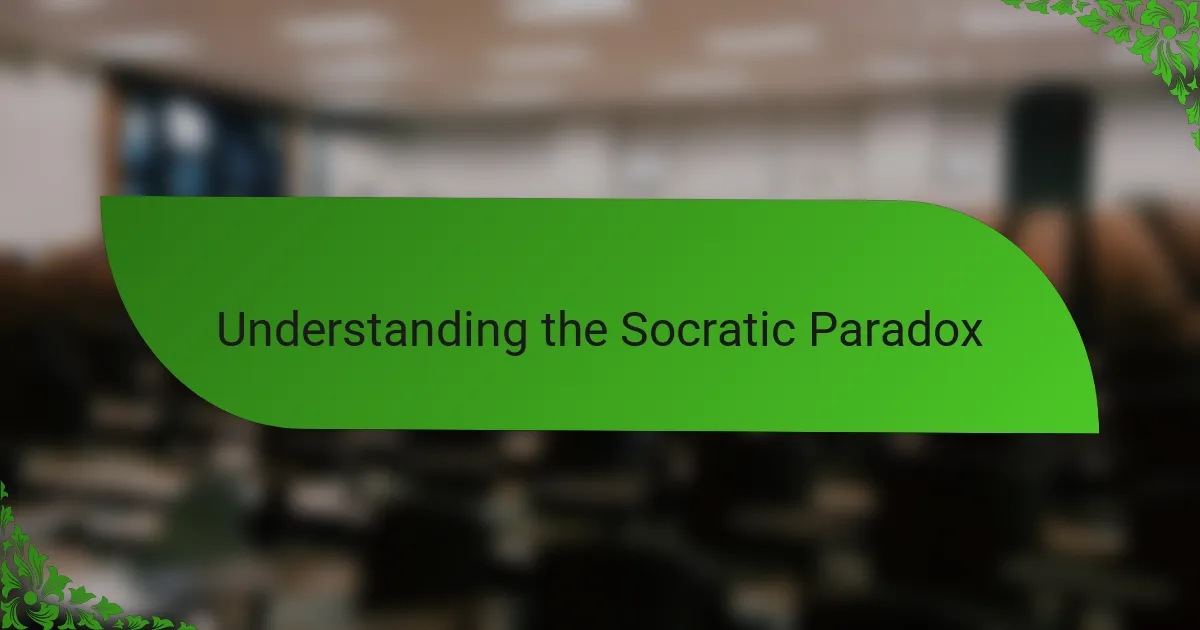
Understanding the Socratic Paradox
The Socratic Paradox, famously stated as “I know that I know nothing,” challenges how we think about knowledge itself. I remember when I first encountered this idea; it felt like a breath of fresh air in a world obsessed with certainty. It made me ask myself, “Can truly knowing nothing actually be a form of wisdom?”
This paradox pushes us to embrace intellectual humility—a lesson I found both humbling and liberating. Instead of pretending to have all the answers, Socrates invites us to continuously question and explore. Isn’t that what learning is all about, after all?
Understanding this paradox reshaped how I approach philosophical discussions. It reminded me that admitting ignorance doesn’t weaken us; it opens the door to genuine inquiry and growth. Have you ever felt that admitting you don’t know something was the best first step toward discovering the truth?
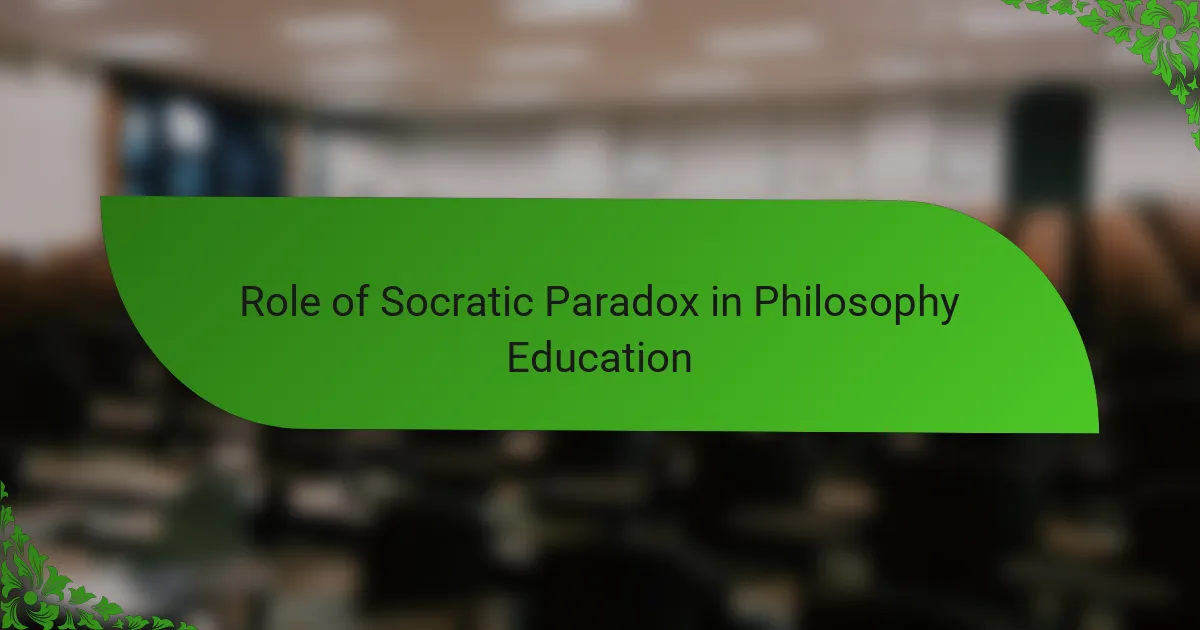
Role of Socratic Paradox in Philosophy Education
The Socratic Paradox plays a crucial role in philosophy education by encouraging students to confront their own limits of knowledge. I’ve noticed that when learners accept “knowing nothing,” their curiosity sparks, and meaningful dialogue emerges naturally. Doesn’t it feel more liberating to explore ideas rather than memorize fixed answers?
In my experience, this paradox transforms classrooms into spaces where questioning becomes more important than simply providing solutions. It challenges both teachers and students to remain open-minded and humble, fostering a learning environment rich with critical thinking. Have you ever seen how admitting uncertainty can energize a group discussion instead of shutting it down?
Ultimately, the Socratic Paradox helps cultivate lifelong learners who value inquiry over certainty. When I reflect on my own journey, I realize this attitude has been essential for deep philosophical understanding. Isn’t that the true goal of philosophy education—encouraging us to think deeply rather than just accumulate facts?
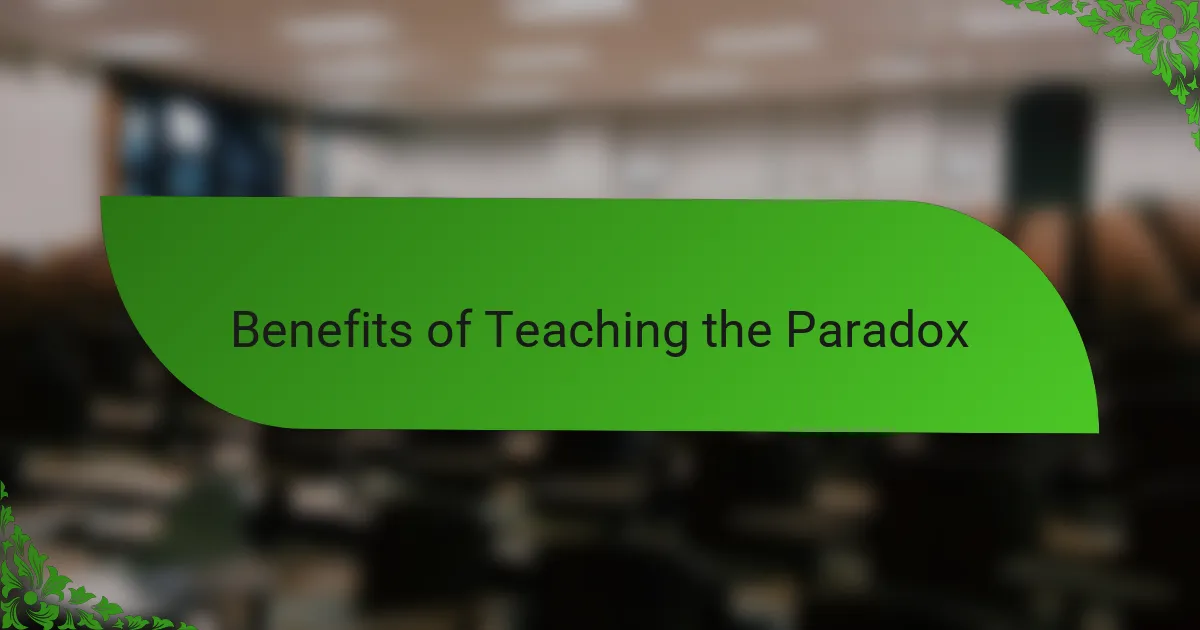
Benefits of Teaching the Paradox
Teaching the Socratic Paradox encourages students to embrace doubt as a starting point rather than a dead end. I’ve seen firsthand how this shift gently pushes learners out of their comfort zones, making them more open to new ideas. Isn’t it exciting when uncertainty leads to genuine curiosity instead of frustration?
Another benefit is how the paradox builds critical thinking skills. When students realize that claiming to know everything is unrealistic, they begin to ask deeper questions and challenge assumptions. From my experience, this kind of intellectual humility creates richer conversations and sharper minds.
Finally, teaching the paradox fosters resilience in learning. I remember a student who struggled with the idea of not having definitive answers but eventually found freedom in the process of ongoing inquiry. Doesn’t that sense of freedom—knowing it’s okay not to know—make philosophy feel less intimidating and more inviting?
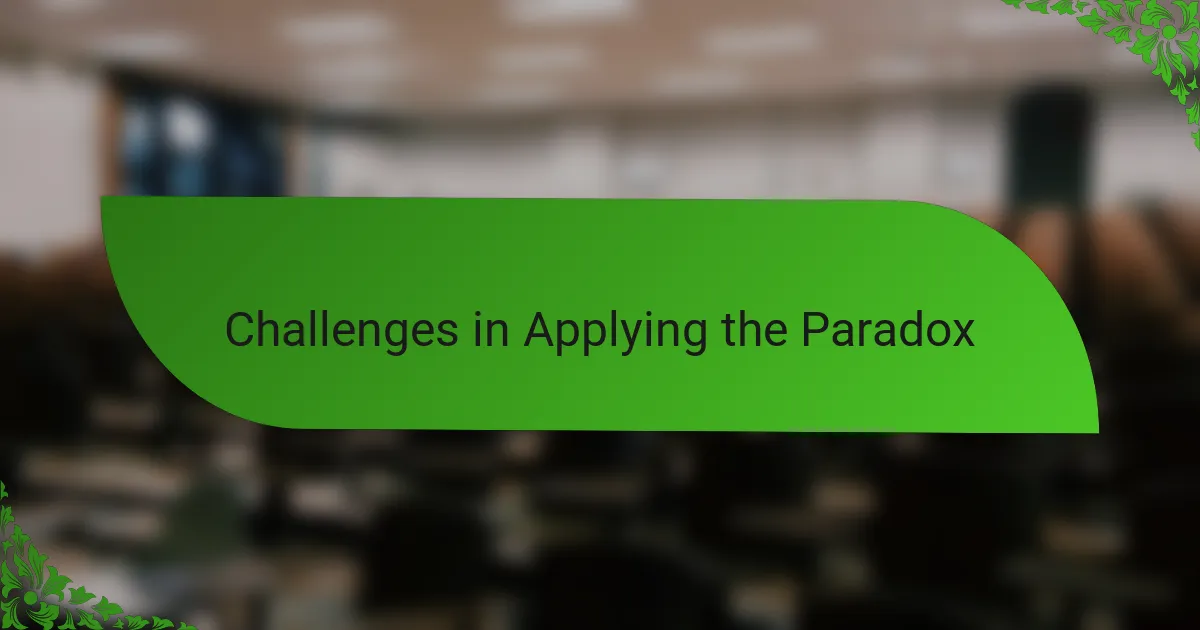
Challenges in Applying the Paradox
Applying the Socratic Paradox in real life is trickier than it sounds. I’ve often found that claiming “I know nothing” can be misunderstood as mere ignorance rather than a thoughtful stance. Have you noticed how people sometimes expect clear answers instead of admitting uncertainty?
Another challenge lies in balancing humility with confidence. In classrooms, I’ve seen students struggle between embracing doubt and feeling lost without firm knowledge. How can we encourage them to value the process of questioning without feeling overwhelmed by the unknown?
From my experience, another hurdle is the cultural pressure to appear knowledgeable. Admitting ignorance can feel risky, especially in competitive environments. I’ve had to remind myself and others that vulnerability in learning is actually a strength, even if it doesn’t always come across that way at first.
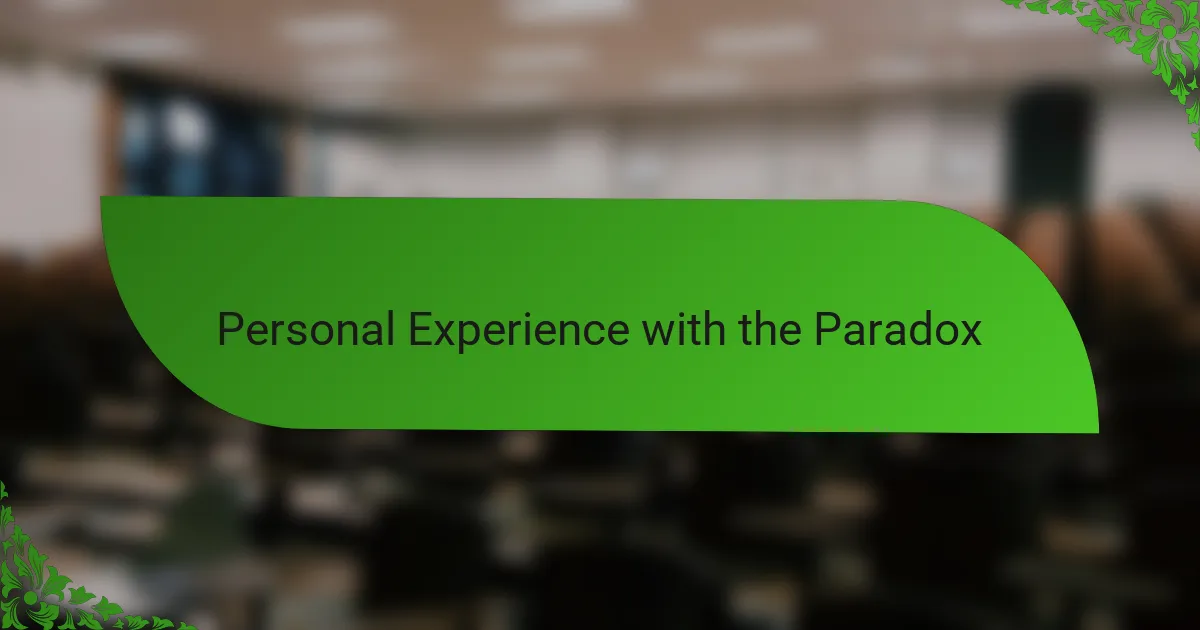
Personal Experience with the Paradox
When I first tried to live by the Socratic Paradox, I noticed an unexpected shift in my mindset. Instead of rushing to answer every question, I learned to pause and genuinely admit when I didn’t know something. That feeling of uncertainty was uncomfortable at first, but it also felt strangely freeing—like finally giving myself permission to be a beginner all over again.
I recall a moment during a philosophy seminar when I openly confessed my ignorance on a complex topic. Rather than feeling exposed, I saw how others responded with curiosity and support. Hasn’t it surprised you how vulnerability often invites deeper connection and richer conversation?
Over time, embracing this paradox helped me become more patient with my own learning process. I stopped seeing not knowing as a failure and started viewing it as an invitation to explore. It made me wonder—how much more could we grow if we all allowed ourselves to embrace the unknown just a little more?
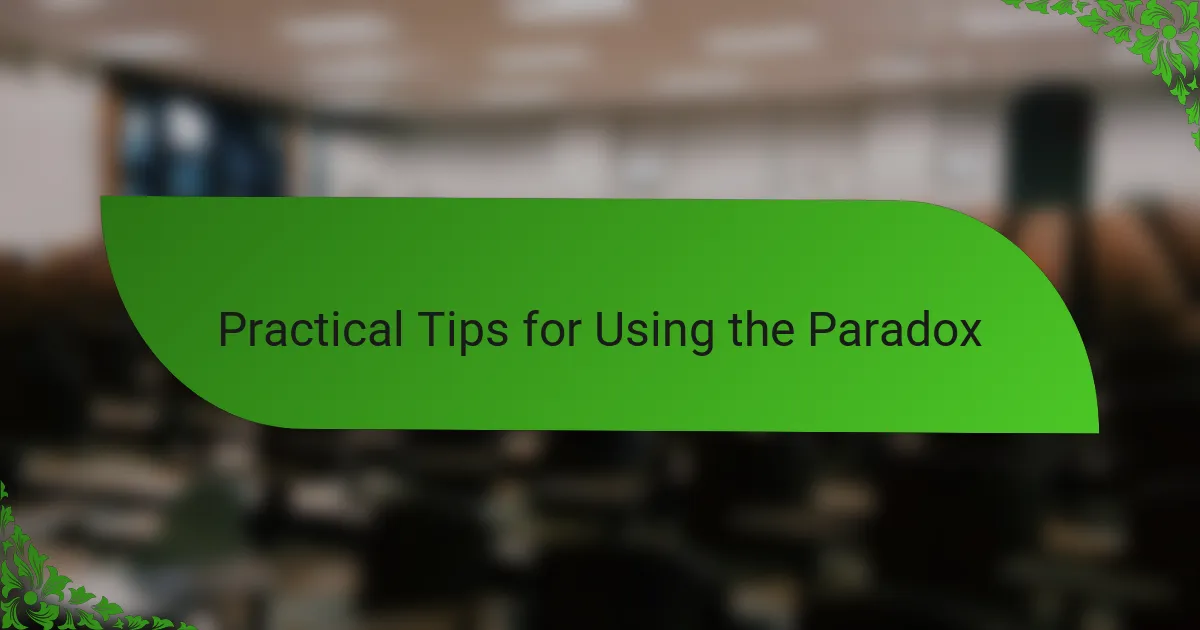
Practical Tips for Using the Paradox
One practical way I’ve found to use the Socratic Paradox is to start conversations with honest questions instead of statements. When I openly say, “I don’t know, but I’m curious,” it lowers the walls that often block meaningful dialogue. Have you noticed how admitting uncertainty invites others to share their thoughts more freely?
I also try to remind myself and others that this paradox isn’t a call to permanent ignorance but a motivation to keep learning. In meetings or classes, I often pause before responding to avoid rushing to conclusions. That moment of silence, uncomfortable as it may be, often sparks deeper reflection and better questions. Could embracing that pause be the key to richer understanding?
Lastly, I encourage learners to journal their evolving thoughts rather than aiming for immediate answers. Writing down what you don’t yet know, alongside emerging questions, transforms the frustration of “not knowing” into a roadmap for growth. I’ve seen this simple habit turn confusion into curiosity—don’t you think that’s a powerful shift?
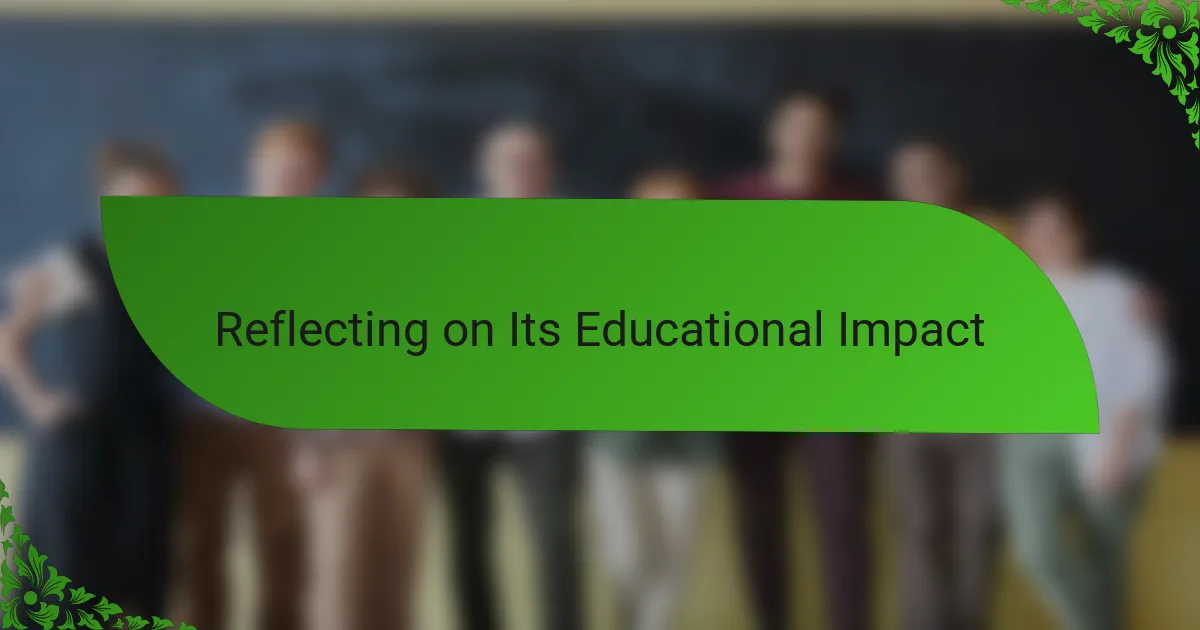
Reflecting on Its Educational Impact
Reflecting on its educational impact, I often see the Socratic Paradox as a gentle nudge that shifts how we teach and learn. When students realize it’s okay not to have all the answers, something remarkable happens—they relax and start to genuinely engage. Have you ever watched a classroom lighten up the moment curiosity takes center stage?
In my experience, that shift creates a space where questions matter more than quick fixes. It’s not just about knowledge anymore; it’s about developing the courage to explore uncertainty. Doesn’t that feel like a much more authentic way to learn?
Yet, embracing this paradox takes practice. I recall times when admitting ignorance sparked not embarrassment, but connection and deeper conversations. Could this openness be the missing piece in making education less about grades and more about growth?